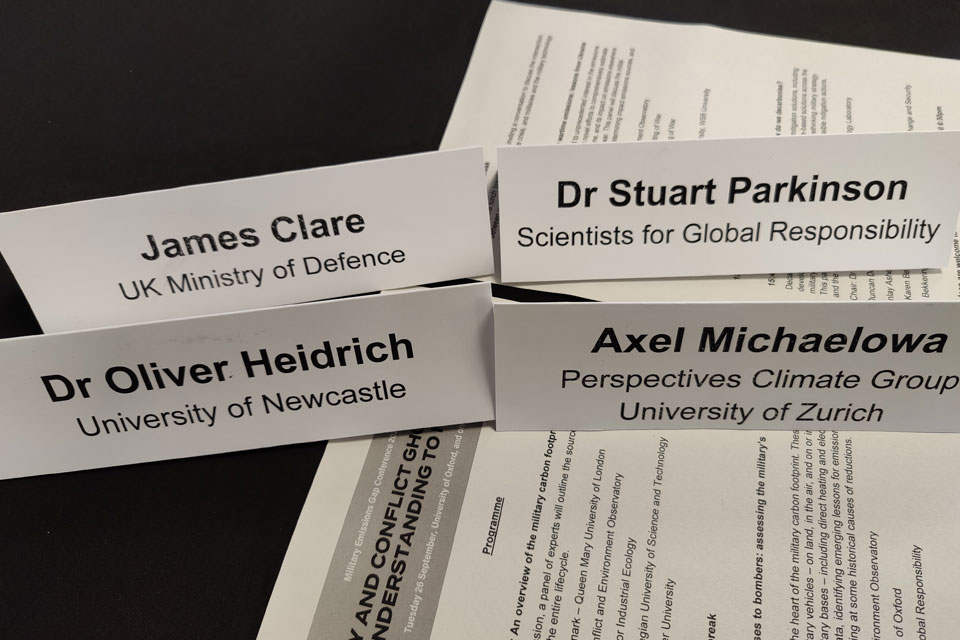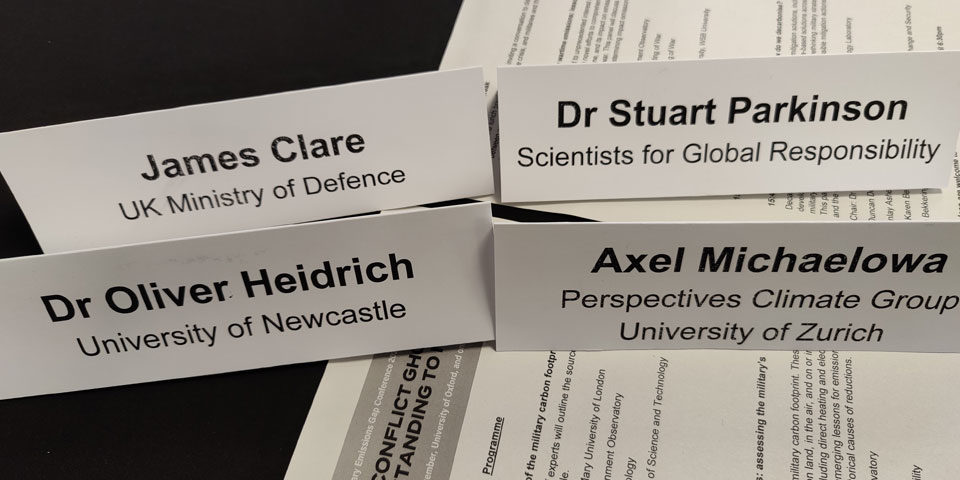CEOBS’ Military Emissions Campaigner Ellie Kinney reflects on the first Military Emissions Gap conference.

September saw the first Military Emissions Gap Conference, held in Oxford, UK. Military Emissions Campaigner Ellie Kinney reflects on what happens when academia, civil society and military representatives have the opportunity to share research, ideas and frustrations.
The conference
In September, we hosted the first international Military Emissions Gap conference, Military and Conflict GHG Emissions: From Understanding to Mitigation. With increased interest in this issue across academia, militaries and governments, a coalition of academics and NGOs coordinated the event to share the latest research, question alternative viewpoints and discuss what is next for this field of research. The coalition involved included CEOBS, Concrete Impacts, Initiative on GHG Accounting of War, Scientists for Global Responsibility, the University of Oxford Department of Politics and International Relations, and Queen Mary University of London Institute for Humanities and Social Sciences.
Against a challenging backdrop
We were pleased to be hosted by Prof Neta Crawford, at the University of Oxford’s Department of Politics and International Relations. However, due to the University and College Workers Union announcing strike action across universities in the UK, including the University of Oxford, the conference was relocated off-campus to support UCU members. Taking place during the world’s hottest September on record, the conference also marked over a year and a half following Russia’s invasion of Ukraine. It also took place just a week after UK Prime Minister Rishi Sunak pushed back net zero deadlines, receiving widespread condemnation from experts and campaigners. Against this backdrop, the conference aimed to outline how these factors – climate, militaries and war – interlink; how militaries contribute to the climate crisis during conflicts and peacetime, what governments can and must do to mitigate this impact, and the role academia can play in encouraging this.
Addressing key issues and finding common ground
The one-day conference focused on four key areas – the sources of military emissions; the importance and challenges of assessing military emissions; emissions resulting from conflicts; and pathways towards military decarbonisation. Between the panellists and the audience in the room, there was representation from across academia, the defence industry, civil servants, environmental organisations, religious groups, and peace advocacy groups.
As the topic has gained more attention, the cross section of interest groups involved has expanded, and we were pleased to have such a diverse range of views represented at the conference. A more in-depth analysis of each panel is available here, or alternatively you can catch up on the live recordings on our YouTube channel.
Across such a range of views and experiences, it was inevitable that not everyone would see eye-to-eye on every issue raised. However, the opportunity to discuss these differences is invaluable, whether through speaker’s presentations, question and answer sessions, or informal discussions over lunch. A notable difference was the gulf between the expectations of civil society and academia, and the reality of government policy ambition, which was particularly evident. However, there was undoubtedly shared ground in the belief that militaries can no longer be exempt from climate mitigation action.
From inaction to cooperation
An implicit theme throughout the day was the impact of militaries being exempt from reporting emissions to the UNFCCC. The consequent lack of available data impacts academic research, and similarly, civil society organisations face barriers in accessing key information due to questionable security concerns around data, and the fact that there isn’t an internationally agreed framework through which to demand accountability. For governments and their militaries, it is clear that they lack an internationally agreed framework to operate from, and that guidance is needed to make up for years of reporting exemptions, which has set a slow pace of action and limited ambition.
Ultimately, research is essential to influence evidence-based policymaking on a national and international level, and so to drive much-needed climate action. While academic interest in this area is increasing, this issue has been largely ignored by policymakers to date. Cooperation between academia, civil society and governments is key to plugging this gap to ensure that military and conflict emissions receive the degree of consideration they need within national and international policy. This conference provided a much needed shared space and what we hope will be the start of an ongoing process of discussion and cooperation.
Ellie Kinney is CEOBS’s Campaigner. CEOBS would like to thank Concrete Impacts, Initiative on GHG Accounting of War, Scientists for Global Responsibility, University of Oxford Department of Politics and International Relations, and Queen Mary University of London Institute for Humanities and Social Sciences for their important role in this conference. This conference was possible thanks to funding from UKRI-ESRC Concrete Impacts.





